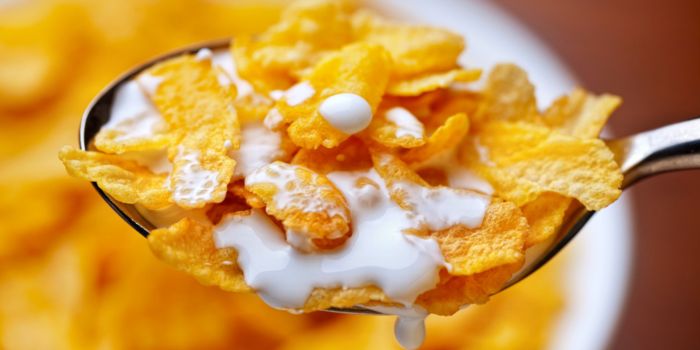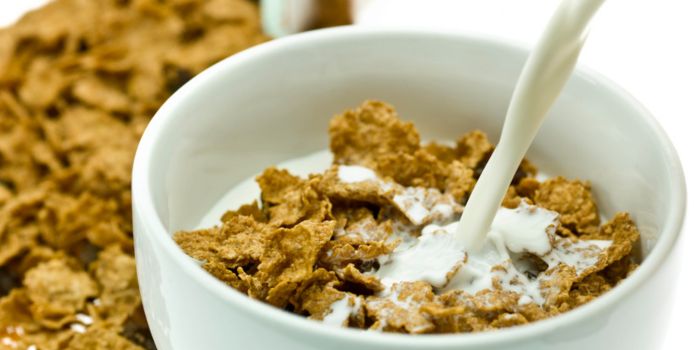Let's face it, mornings can be chaotic. AND Cornflakes offer a quick and easy solution, requiring minimal preparation and often paired with readily available milk.
Their familiar and nostalgic crunch and perceived healthiness further solidify their appeal.
In the realm of breakfast choices, cornflakes have long held a prominent place on the table of many households worldwide.
The marketing of cornflakes as a healthy breakfast option has shaped consumer perceptions for generations. Clever advertising campaigns, celebrity endorsements, and nostalgic associations with different mascots have cemented cornflakes' status as a breakfast icon.
Marketed as a convenient, quick, and seemingly healthy breakfast option, cornflakes have been a staple in the diets of millions for a long time. Cornflakes evoke a sense of nostalgia and convenience.
But are they truly a healthy way to start your day? Let's dive deeper and examine their nutritional profile, potential benefits, and drawbacks. This blog delves into the nutritional profile of cornflakes, exploring their pros and cons to help you make informed choices for your morning ritual.
Table of content
The Anatomy of a Corn Flake
Cornflakes, as the name suggests, are primarily made from milled corn which means at their core, cornflakes are simply toasted flakes of cornmeal.
The corn is processed into a dough-like consistency by mixing it with water, sugar, malt flavoring, and salt; then it is rolled flat, toasted, and finally flaked into the familiar crunchy cereal we recognize.
Some sources also suggest that cornflakes begin as whole corn kernels, and then are milled and toasted into light, crispy flakes.
This means they offer some inherent benefits like being low in fat.
They also contain some essential vitamins and minerals like folic acid and iron, often added during fortification.
However, the processing involved in transforming corn into flakes strips away much of its natural fiber and other valuable nutrients. The processing methods and additional additives, while contributing to their shelf life and familiar crunch, also significantly reduce their fiber and nutrient content, thus, significantly impacting their nutritional value.
Read Now: Circuit Training Exercises
Nutritional Breakdown
On the surface, cornflakes appear to offer a decent array of nutrients, including carbohydrates, fiber, protein, and a variety of vitamins and minerals. But let’s delve deeper into the bowl to find out the nutritional profile, and dietary intake of a typical serving of corn flakes.
Per suggested serving (25-30 gms)(4 Tbsp)
(We’ve compiled this data from multiple nutrition labels; It might not represent the actual readings of your Cornflakes brand, this is just to give you an idea)
- Calories: 100-150 (depending on added sugars)
- Fat:1-2 gms
- Protein: 2-3 gms
- Carbohydrates: 25-35 gms (refined)
- Sugar: 2-10 gms (depending on the variety)
- Fiber: 1-3 g
- Vitamins and minerals: Often fortified with Vitamin B and Iron.
- Sodium: 200-300 mg
Pros: Fields where Cornflakes get a shining star rating
What Makes Cornflakes so Popular?
What has made Corn Flakes a long-running success is the variants that have been introduced in the market. There are so many options available that the breakfast option doesn’t feel repetitive or boring.
1. Convenient and Versatile
Also Read: How to Lose Weight in 8 Weeks?
Their quick preparation, Ready-to-eat quality, and ease of storage make them a convenient breakfast choice. Due to their versatile nature, they are a good breakfast option for fussy eaters, be they kids or adults.
2. Gluten-Free
Naturally gluten-free, Corn flakes cater to individuals with dietary restrictions.
3. Low-Fat Content
Cornflakes are naturally low in fat making them a suitable option for those watching their fat intake.
4. Fortified with Nutrients
Many brands fortify their corn flakes with B vitamins and iron, essential for energy production.
Read Now: Substitutes to Powdered Sugar
Drawbacks of Cornflakes
1. Processed Ingredients
Many commercially available cornflakes contain processed ingredients, additives, and preservatives to enhance the flavor, texture, color, and shelf life.
Consuming processed foods regularly is shown to contribute to inflammation, metabolic dysfunction, and other adverse health outcomes.
2. High in Refined Carbohydrates
Carbohydrates make up to 93% of the nutritional value of cornflakes. Most cornflakes are made from refined cornmeal, lacking the fiber and complex carbohydrates found in whole grains.
This can lead to blood sugar spikes and crashes, leaving you feeling hungry sooner.
3. Added Sugar & Salt
Many brands add significant amounts of sugar and sodium (salt), as sweeteners during the processing stages of cornflakes contributing to your daily sugar intake, and potentially increasing the risk of weight gain.
4. Low in Protein & Fiber
With only 2-3 grams of protein, and 1–2 grams of fiber per serving, cornflakes lack the satiating power of higher-protein, and high-fiber breakfasts, leaving you feeling hungry sooner.
Also Read: Popular Weekly Meals for Two
5. Limited Nutritional Profile
Despite their reputation as a breakfast staple, cornflakes offer limited nutritional value. Some cornflake varieties are fortified with vitamins and minerals to enhance their nutritional value. However, relying solely on fortified flakes for essential nutrients may not be optimal.
Cornflakes typically offer a little bit of protein, but it's often incomplete and lacks the full spectrum of essential amino acids.
6. High Glycemic Index
Cornflakes have a high glycemic index - almost 82, meaning they can cause rapid spikes in blood sugar levels.
They usually also contain High-fructose corn syrup.
Prolonged consumption of high-glycemic foods may increase the risk of insulin resistance, type 2 diabetes, and weight gain.
Also Read: How to Get Fit at Work?
Weighing the Evidence - The Verdict
So, are cornflakes inherently bad? Not necessarily, but their limitations need to be acknowledged.
Cornflakes, while convenient and potentially low in fat and calories, shouldn't be crowned the champion of healthy breakfasts because they are majorly just made up of carbs.
Their high refined carbohydrates, low fiber, and potential added sugar content lead to quicker blood sugar spikes and crashes, thus raising concerns about their nutritional value and impact on health.
But with a few additions and carefully reviewed substitutions, they can be enjoyed as a breakfast option, occasionally and in moderation.
Also Read: Why Take Senna at Night?
Adding Value to Find a Balance
Navigating the vast landscape of breakfast options can be overwhelming, but making informed choices doesn't have to be complicated. Consider the following tips:
1. OPT FOR MINIMALLY SWEETENED VARIETIES
There are a number of brands available in the market. Look for brands with lower sugar content.
You can also adjust sweetness with naturally sweet toppings like fruits.
2. PAIR WITH WHOLE FOODS
The biggest drawback of cornflakes is that they lack nutritional value, which can be increased by adding whole nuts, seeds, and fruits, and using Greek yogurt with your serving of corn flakes.
Also Read: Is Chickpeas Pasta Healthy?
3. BALANCE AND VARIETY
Keep experimenting with your choice of fruits, toppings, and sides to keep your breakfast routine exciting all the while eating healthy.
4. MINDFUL EATING
Pay attention to how your body feels after consuming cornflakes. If you experience energy crashes and cravings, cornflakes might not be the best choice of breakfast food for you. Pay attention to the cues of your body and foster a positive relationship with food.
5. CONSIDER ALTERNATIVES
If you notice that cornflakes are no longer what you need for your healthy eating habits, explore whole-grain cereals, oatmeal, and eggs with toast for a more balanced and nutritious breakfast that will have added health benefits
ALTERNATIVES FOR A WHOLESOME START
By understanding the pros and cons of cornflakes, and exploring alternative breakfast options, you can empower yourself to make informed choices for a healthy and fulfilling start to your day.
Expanding your breakfast horizons might look like a giant undertaking, but here are a few options to get you started:
Also Read: Is Pilates Good for Weight Loss?
FOODS YOU CAN MEAL PREP
- Overnight Oats: Overnight oats or oats, in general, are a very customizable breakfast food, and with overnight oats, you don't have to do much in the mornings, just grab your jar and spoon and enjoy! Overnight oats are packed with fiber, protein, and healthy fats. Top them with your favorite fruits and nuts, or add honey and maple syrup for sweetness.
- Chia Pudding: Also an overnight breakfast idea, chia pudding is a source of fiber and packs many essential micro-nutrients.
- Granola: Whole-grain granola is a protein-rich and nutrient-dense breakfast option. Add Greek yogurt, fruits, and nuts as toppings and enjoy.
- Sheet Pan-Omelette: Cook a batch of eggs mixed with your favorite veggies and spices as an omelet on a baking sheet, cut into squares, and store for the week. Just reheat and add on toast.
FOODS WITH LESS THAN 30 MINUTES OF COOK TIME
- Scrambled eggs: Eggs are a classic protein-rich breakfast option that can be prepared in many ways. Scrambled eggs literally take less than 10 minutes to make, and are customizable by adding veggies and different spices to the mix.
- Sunny-Side Up: Another egg variation, and also quick to make. Add on the top of your toast, season well, and enjoy!
- Oats Pancakes: Where the normal flour pancakes might not be considered as healthy, pancakes made from oat flour are definitely a healthier option. Serve hot with maple syrup and fruits.
Start exploring new breakfast foods and experiment with the flavors, it will only make you more of a culinary savant.
REMINDERS FOR A HEALTHY DIET
READ NUTRITION LABELS CAREFULLY: Be it the ingredient list, nutrition facts, dietary intake, or any other information given on the food labels at the back of the packet; Read them carefully.
PORTION CONTROL: Anything can be a part of your healthy eating habit, when eaten in moderation and in a balanced way. So be sure to control your portion size when it comes to food like cornflakes because they aren’t as filling as whole grains or other whole foods.
This blog is meant for informational purposes only. DO NOT consider it as medical advice.
Always consult with your doctor or registered dietitian for personalized dietary guidance.
Read Our Most Read Content:



